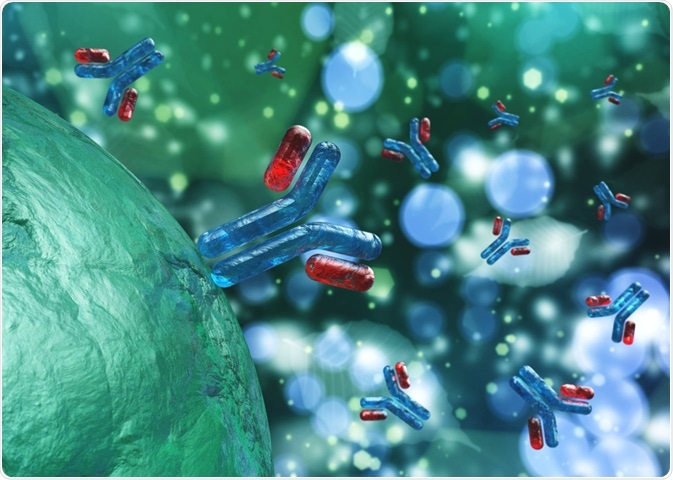Antibody-dependent cell-mediated cytotoxicity (ADCC) refers to the killing of a target cell which is coated with antibodies by an effector cell of the immune system.
 Image Credit: ustas7777777 / Shutterstock
Image Credit: ustas7777777 / Shutterstock
ADCC steps
First, the B-cell produces antibodies directed against specific antigens present on a pathogen or a foreign body.
These antibodies bind to the target antigen and the constant region of the antibody (Fc) is recognized by the effector cells of the immune system via Fc receptors on their surfaces.
Following recognition, the effector cells release chemicals which then lyse and kill the target cell bound to the antibody. This mechanism forms a crucial part of the immune response.
Activation of ADCC
ADCC can be activated by several channels.
Specific binding of antibodies
In most cases, the activation of ADCC involves the binding of IgG antibodies to antigens, although infestation by invasive helminths and some other parasites, IgE antibodies may be bound to the antigen on the pathogen surface.
Recruitment of immune cells by the Fc fragment of the antibody
The constant region of the antibody can recruit different kinds of immune cells, including granulocytes such as neutrophils, monocytes, eosinophills, as well as macrophages and natural killer cells.
Effector cells
Different kinds of cells are recruited to the site of target cell-antibody reaction following the recognition of the antibody’s Fc fragment, and these cells act via different methods to kill the target cell.
Macrophages: Macrophages are involved in killing the target cell by releasing lytic and toxic enzymes at the target site.
Natural killer (NK) cells: These cells can recognize pathogens which do not express MHC, and they act by releasing granzyme and perforin proteins which bore holes in the cellular membrane of pathogens, thereby killing them.
Neutrophils: These cells are involved in recognizing pathogenic bacteria, and they act by releasing lytic enzymes and generating reactive oxygen species (ROS) which destroy the invading microbes.
Eosinophils: These cells are involved in recognizing parasites, leading to their activation with the release of toxic substances which lead to the death of the pathogenic cells
Natural Killer Cells
Mechanisms of cytotoxicity
It is now established that Fc receptors need to be crosslinked to initiate the signaling cascade which leads to cytotoxicity. Binding of monomeric IgG is not sufficient.
This process of crosslinking is based on the recognition of several signals which in turn depend upon the antibody and the Fc receptor, other signaling molecules, and the effector cells.
Mechanism of cell destruction
Calcium-dependent processes
In certain processes, after the target is recognized, a calcium-dependent exocytic cascade is activated which leads to the release of intracellular granules from an effector cell which target the pathogen.
One such molecule is perforin, which attaches to the cell membrane and forms a pore. The subsequent leakage of intracellular material and ionic imbalance leads to cell lysis. Another is granzyme B, an enzyme which is involved in DNA fragmentation within target cells.
Engagement of Fas
Some target cells express the Fas antigen, which is then engaged by a host cell molecule called Fas ligand. This activates a cascade of signaling which ultimately leads to cell death mediated by NK cells.
Release of reactive oxygen species
Certain effectors cells, such as monocytes, macrophages, and neutrophils can release reactive oxygen species when the Fc receptors are cross-linked. The reactive oxygen species then lead to the death of the target cell.
Perspectives
ADCC is a critical component of host immunity and some of the antibodies specifically directed against tumor cells have also been shown to play a role in treating tumors in mice models in vivo.
ADCC is invoked when antibodies bind with both the antigen present on the target cell and Fc receptors on the effectors cells of the host. This process ultimately leads to the killing of the pathogenic target cell by the host.
Further Reading
Last Updated: Jul 18, 2023